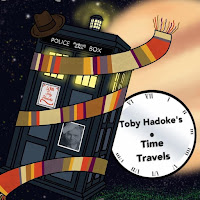First, that original series had - like lots of the BBC's science documentaries then and now - a lot of Burke out in the field, striding through picturesque locations to illustrate his thesis. Here, things are on a smaller, less expensive scale with the older Burke on a virtual set, his arguments illustrated by what looks like stock footage and bits of CGI swirling around him. At some points they use CGI to animate him - he even dances (!) - and there are also some props, such as when he dons the Macktinosh waterproof coat he's telling us about. But the effect of all this is to underline that these are basically lectures. It's all more TED talk than Brian Cox out on a mountain pointing at stars.
Nowhere is this more starkly evident than in Episode 5, where Burke discusses the usefulness of the vacuum flask. He makes his case then turns and points behind him, as in the screenshot above. We get a CGI animation of a rocket blasting off - a fun gag and call-back. In the original, out on location and perfectly timed to the launch of the Titan-Centaur rocket carrying Voyager 2 in space, it creates an iconic bit of TV:
(Burke's old programmes are full of extraordinary, ballsy stuff like this. He explains gravity while sat on a roller-coaster, and hands the Apollo astronauts a plastic bag they all recognise and asks them to explain how this was used as a toilet in space.)
Secondly, each episode in the new Connections begins with a change that hasn't happened yet: a prediction of the near future. The old BBC series used connections to explain how we got to be where we are; this new series is about where we're going.
To give a sense of the format, Episode 1, Seeing the Future, begins with Burke talking about the potential of quantum computing to crunch such vast sets of data that it will be able to predict the future to a high degree of accuracy. We then duck back in time to 1814 and the Emperor Napoleon Bonaparte's toothpick. Animation in a style slightly reminiscent of Monty Python shows Napoleon escaping from Elba.
 |
| An example of the animation from Connections with James Burke |
The fun is in seeing how Burke will get from this toothpick to quantum computing in a series of logical steps. Those steps are often surprising because of unintended consequences of a given change or new invention. Sometimes it's a less direct connection. For example, Napoleon's toothpick was supplied by George Bullock, and Bullock's brother William didn't just ship stuff out from the UK but also brought stuff home, organising exhibitions of exotic stuff in "living museums". To ship such stuff from far-off locales, Nathaniel Bagshaw Ward perfected the "Wardian case", which meant plants survived long journeys. That, in turn, meant Robert Fortune could smuggle tea plants out of China and help set-up tea plantations in India, with a profound impact on trade.
We're then on to the ships used to carry these good quickly - the clippers using sail and then the iron ships powered by steam. Then we're onto the same ships carrying palm oil, and it's use in soap, and the way that was packaged and branded... On and on it goes, a hop-scotch through time, with regular recaps of the connections so far.
Episode 2, The End of Scarcity, predicts the universal replicator by following the chain from Louis XIV's wig.
Episode 3, In the Net, predicts humans merging with the internet and Episode 4, None of This is Real, predicts avatars that are indistinguishable from humans, with AI as the gatekeeper to knowledge - the latter reached by following a chain from shipworm.
Episode 5, Designer Genes, gets to the titular editing of who we are from coffee beans in Leipzig, and the final episode, Limitless Energy, predicts energy autonomy based on perovskite solar cells leading to a post-scarcity society with no need for climate change or war - all from the starting point of a potato.
Burke is an engaging and often funny speaker, with just the right tone of irreverence for these leaps of imagination. For example:
"In 1852, one of [William Bird] Herapath's students notices, as you would, that if you add iodine to dog's urine, if the dog has already been fed quinine - okay, okay, but this is what geeks do - then you get needle like crystals." (None of This is Real)
These crystals polarise glass, leading to the invention of both polarised glasses and the polaroid camera.
But there's plenty of serious stuff behind these arguments. A key theme is the way science can open up opportunities and provide benefits for all. In discussing the steps that lead to designer genes, he notes that two brilliant women responsible for key connections along the way, both died while young. Given that the end point is about improving health, he asks what Ada Lovelace and Rosalind Franklin might have gone on to contribute if they'd lived longer.
That, I think, is another key difference from the original series, which I felt assumed a male viewer, Burke speaking to his peers. This is all much more inclusive and I don't think Burke is now talking to his own generation. Instead, he addresses those who will follow, encouraging them to take part in the bright future he sees ahead. That's what really strikes me about this series: it's optimism for where we go next.
See also:
- Interview with Burke about the new series by Jennifer Ouellette for Art Technica
- Me on The Pinball Effect by James Burke
- Me on Doctor Mirabilis by James Blish (1964), my reading informed by watching Burke's 1985 series, The Day The Universe Changed



















































